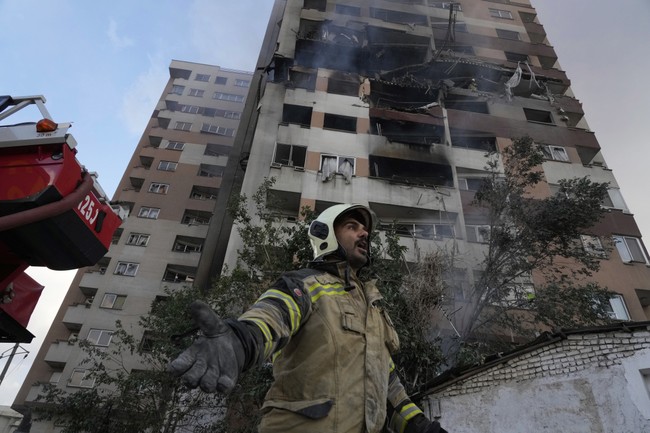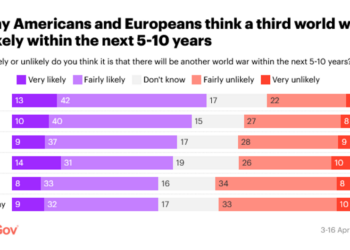
Let’s put it this way: this may be the only statement Hamas has issued with which the Israelis will agree 100%. In fact, it’s the main reason Iran has seen its strategic position crumble so badly over the last two years, and perhaps especially the past eight months.
They chose their cause — or really just their cover — poorly.
Of course, Hamas means this as a compliment, but it reads more like an epitaph:
The Palestinian Islamist group Hamas said Iran, its strategic ally, was “paying the price” for supporting terrorist groups in Gaza in their decades-long struggle against Israel, after Israel launched large-scale attacks on Friday against Iran.
Hamas leaders have repeatedly thanked Iran for its military and financial support to the group in its fight against Israel, including during the ongoing war that erupted in October 2023.
“Iran is today paying the price for its steadfast positions in support of Palestine and its resistance, and its adherence to its independent national decision,” Hamas said in a statement.
That is certainly true as far as it goes, but the truth of that statement goes much farther. Iran didn’t just offer rhetorical support or even diplomatic support for the two-state solution, as do Saudi Arabia and the other Sunni Arab nations now in the Abraham Accords partnership with Israel. The IDF didn’t bomb Iran yesterday and won’t continue to do so because Iran wanted Palestinian statehood. Iran wanted a genocide of the Jews and the destruction of Israel, and has funded the terror operations and proxies in the region that carry out that mission.
Including Hamas, of course, as is hardly necessary to add. And that’s where the fatal error occurred. Hamas launched its October 7 atrocities with the expectation that it would prompt either a limited exchange with Israel or a united battle of Iranian proxies if Israel truly escalated. Thanks to that rash decision, Iran opened the door to the strategic catastrophe that followed.
First, Israel made clear that they would conduct a full-scale war against Hamas in Gaza. Hezbollah then tried to enter the war, which Israel pushed to a stalemate for almost a year to deal with Gaza. When Israel decided to deal with Hezbollah, they rapidly collapsed its leadership structure so badly that it couldn’t function in its main mission to keep Bashar al-Assad in power. Assad had to flee within weeks of Israel’s demolition of Hezbollah, and Iran lost all of the forward defenses against the exact kind of attack that Israel is now conducting in Iran, seemingly at will so far.
But that’s not the only way in which the regime chose poorly. They used the Palestinian cause as a cover for their tyrannical rule over the Iranian people, and the Iranians hate the Palestinians for that reason. Perhaps especially after October 7, Iranians worried more about getting destroyed by Israel because of Hamas rather than the need for a Palestinian state. And in that context, the ability of Israel to get precise intel on the leaders of the Iranian military might be a bit easier to understand, as Katie Pavlich pointed out earlier:
Israel being able to eliminate the Iranian regime’s top tier commanders, in a matter of hours, speaks volumes about how much the Iranian people hate the Ayatollahs. pic.twitter.com/TAmQEseteG
— Katie Pavlich (@KatiePavlich) June 13, 2025
How does Israel get such precise and actionable intelligence? It’s not by infiltrating Iran with Israeli spies, although that did happen in this instance, but those operators were targeting Iranian defense systems. For instance, this is just one of the ways that the Mossad attempted to disable Iran’s ballistic-missile operations:
A convoy of ballistic missiles was attacked using anti-tank missiles launched from the ground 👇
Looks like Israel 🇮🇱 controls not only the airspace of Iran 👀
— Dr. Eli David (@DrEliDavid) June 13, 2025
That’s the kind of missions that Israel’s spies are being tasked with completing in this attack, not trailing regime figures. The Mossad gets its breathtaking intel advantage from the people in Iran who despise the regime for its brutality and extremism, as well as its unrelenting 7th-century oppression of a cosmopolitan people, especially in Tehran. It’s why the Mossad could penetrate the high-security residential facility that the regime provided to Ismail Haniyeh last summer and target him for assassination right under the noses of the IRGC.
And now, the connection between the IRGC and proxies like Iran has been broken, and with it, Iran’s entire command structure for its regional strategy has ‘collapsed’:
NEWS: Iranian sources say Gen. Ismail Ghaani, the Quds Forces commander, in charge of proxies in the region has been killed. The senior chain of command has collapsed.
— Farnaz Fassihi (@farnazfassihi) June 13, 2025
That puts Hamas in an even more dire position than before. They have largely been cut off from outside support since Israel seized the Philadelphi Corridor, but Iran tried to use Hezbollah and the Houthis to put pressure on Israel to back off, especially the latter. If the Quds Force command structure has collapsed, then they are all without the main support for their operations and without cover for the first time ever.
And at least Hezbollah has read the writing on the wall:
A Hezbollah spokesperson told Newsweek on Friday that the Lebanese group remains committed to a ceasefire agreement with Israel after the country launched an attack on Iran.
“Hezbollah is committed to the ceasefire agreement, even though Israel has not respected this commitment over the past period,” the spokesperson said. “It continues to kill, assassinate, and attack areas, including entering border villages and remaining at the five points.”
Reuters also cited a Hezbollah official on Friday as saying that the group “will not initiate its own attack on Israel in retaliation for Israel’s strike.”
Hezbollah is barely hanging on in Lebanon, where the government has the first opportunity in more than forty years to free itself from the grasp of Iranian control. Hezbollah wants to belatedly turn into a political party, but they won’t survive long once they are disarmed by the Lebanese Army, and that will be the bare minimum demand for their supposed transformation. If Iran’s mullahs are finished — or at least if the IRGC and Quds Force get humiliated — then there isn’t much of an argument for a Hezbollah political party anyway. Lebanon’s Shi’ites would be better advised to create a new party that eschews any connection to terrorism and any history with the mullahs of Tehran.
So yes, Hamas has diagnosed the predicament faced by Iran’s mullahcracy accurately. And they may have written its epitaph, as well as their own.

















